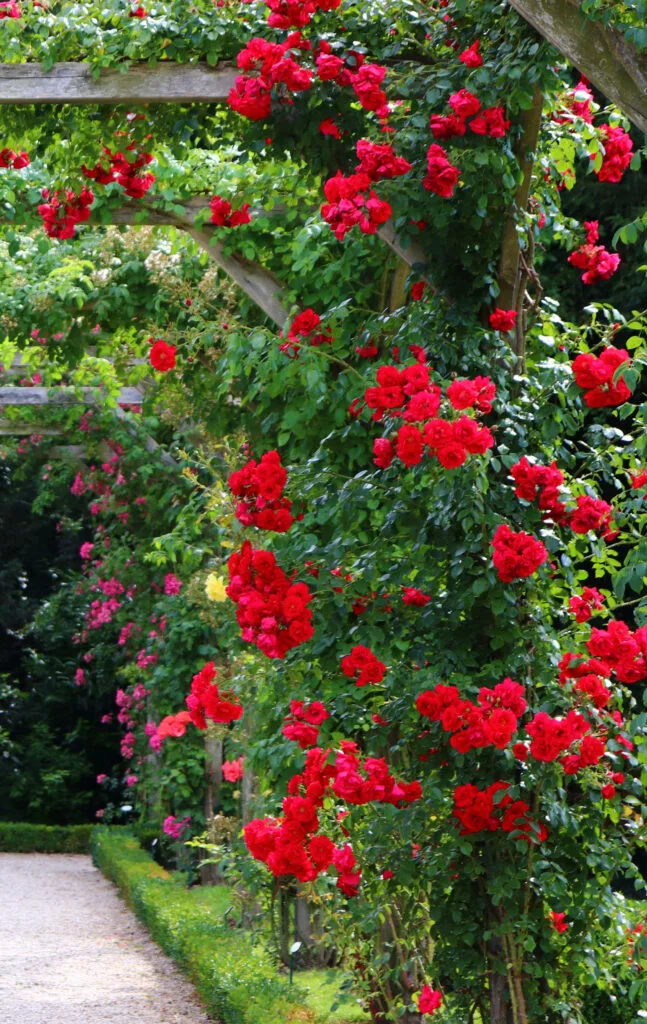Fertilizing your rose bushes at the right time and with the right fertilizer can play a significant role in not only the health of your roses, but in just how often and how prolific they bloom each year.
Rose bushes rely heavily on the nutrients in the soil to produce their blooms. In addition, they also need a good base of power from the soil to develop strong stems and foliage. Unfortunately, because of those constant needs, they can deplete the energy from the soil they grow in fairly quickly.
Without recharging the soil each and every season, it can begin to cause a struggle for your roses. Not just to bloom and flower, but to simply stay healthy. Many rose varieties are extremely susceptible to disease and pest issues. And when a plant begins to struggle or weakens, it becomes even more vulnerable to attacks.
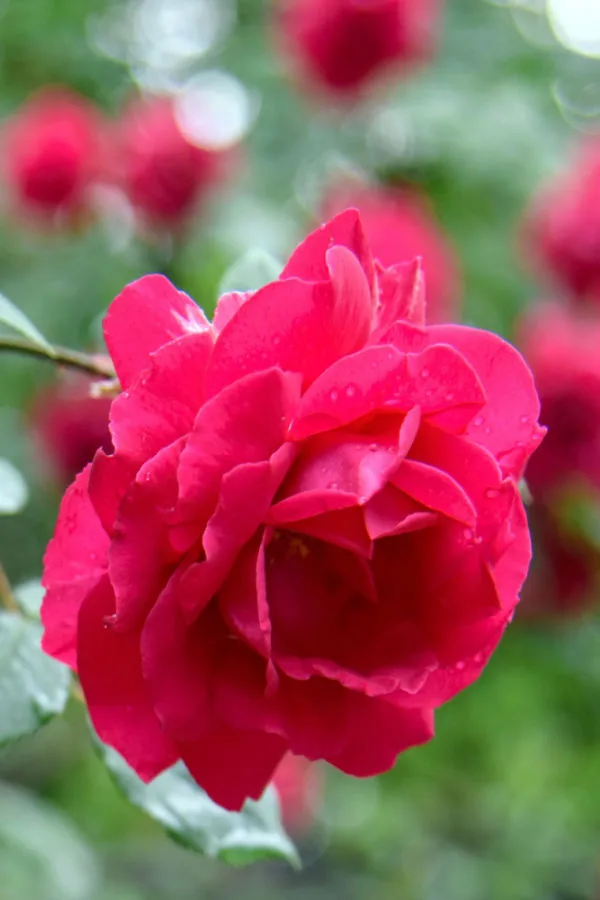
So what is the best way to fertilize your bushes for ongoing success? And what are the best choices and methods to apply fertilizer? That is exactly what today’s article will cover, including when to time up your applications to get your roses blooming bigger and brighter than ever!
The Secret To Fertilizing Rose Bushes
Although there are thousands of rose varieties, most roses can be divided into two main categories when it comes to how they should be fertilized.
Shrub and climbing roses are more established and grow quite steadily in the soil. They feed slowly from the ground to produce their foliage and flowers and are not heavy feeders. Because of this, a spring and late summer/early fall application of fertilizer is more than enough to keep them blooming.
Tea roses, Grandiflora, Floribunda and miniature roses on the other hand all require more frequent energy boosts to power blooms. When they flower and begin to form new buds to flower again, it can require more energy on a consistent basis.
As you will see below, for these roses, a low but steady dose of nutrients is the best way to have them continually flush with roses. Now that we have covered the timing of fertilizing, we will take a specific look at which fertilizers are best for roses, and when and how to apply them.
The Best Fertilizers For Rose Bushes – The Secret To Fertilizing Rose Bushes
In general, roses prefer slightly acidic soil. It is important when providing them with energy to select fertilizers that will not change the pH too far to the alkaline side.
Fertilizers can be broken down into two types, dry (granular) or liquid – and each has a place for energizing rose bushes. Dry / granular fertilizing is best for spring and late summer/early fall applications for all rose types.
It is actually the only type of fertilizer you will need for shrubs and climbing roses. However, as you will see below, liquid fertilizer is wonderful for powering tea roses, Grandiflora, Floribunda and miniature roses for the in-between doses.
Natural Dry Fertilizing Choices
One of the best natural dry energy sources of all for roses is compost. Compost is teeming with all of the nutrients that roses require. Even better, it releases them low and slow to provide a constant feeding to the roots below. Best of all, the pH of compost is neutral, so it won’t affect the soil around roses either.
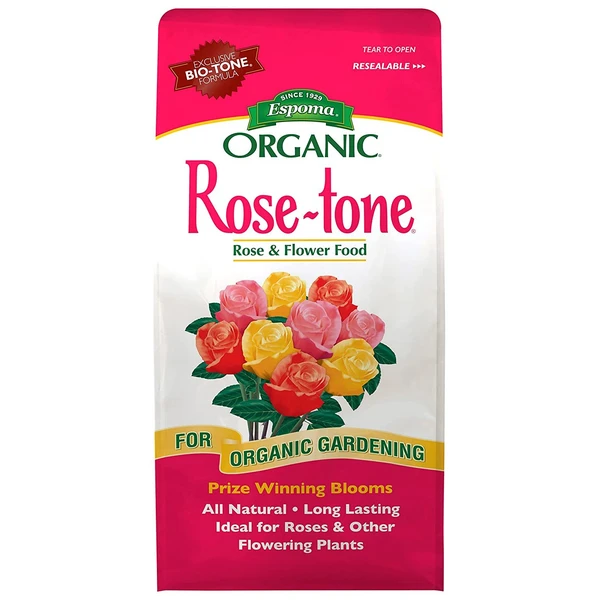
Worm castings are another great option for fertilizing roses low and slow. Not only are their nutrients easy for plants to absorb, but they also tend to be just slightly on the acidic side when it comes to pH, which makes them a natural for roses. Affiliate Product Link : Pure Worm Castings
Not only can compost and worm castings be used as a top dressing fertilizer for roses, they can also be made into a wonderful energizing liquid fertilizer for them as well. And it couldn’t be easier to do – all you need to do is add water!
Commercial Options – The Secret To Fertilizing Rose Bushes
If you are looking for a commercial fertilizer, select a fertilizer specifically designed for roses. This will not only account for the pH requirements, but also keep the N-P-K ratios in line as well. Granular fertilizers are excellent for low and slow feeding.
Not only are granular fertilizers easy to sprinkle around the plant and drip line, they don’t overpower plants with their slow release formula. For best results, look for a fertilizer that contains a good dose of calcium to help with strong stem and cell growth. Product Affiliate link : Espoma Organic Rose-Tone 4-3-2 Organic Fertilizer With Calcium
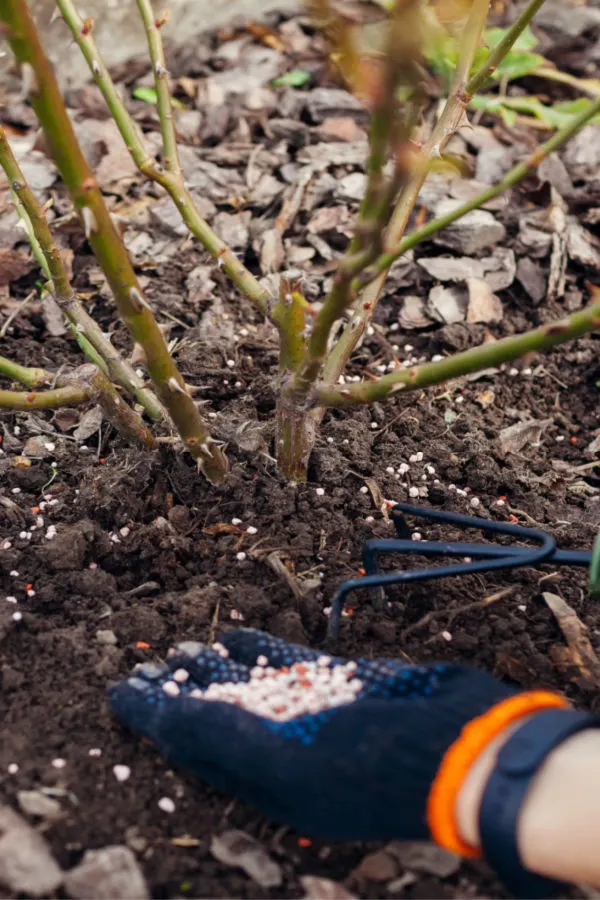
Fertilizing Roses – How & When To Apply
When you fertilize your roses plays a huge role in getting them to bloom bigger and better. As covered above, that means hitting your roses with the right type of fertilizer at just the right time. That, of course, all depends on which type of rose bush you are fertilizing.
Fertilizing Shrub and Climbing Roses
For shrub and climbing roses, the first dose of power should be applied in the spring right before or as the rose bush is starting to get its first leaves. If using compost, apply a two to three inch layer around the bush. Extend the ring of compost to the edge of the bush’s branch line.
If using worm castings or granular fertilizers, apply around the bush’s base. For castings, apply 1/2 cup for every square foot. For granular fertilizers, use the recommended dose on the label.
This is where a small hand-held rotary cultivator is great for blending the fertilizer or the castings into the soil. A few rolls of the spikes of the cultivator and the soil mixes perfectly to settle in. Affiliate Product Link: Altdorff Rotary Cultivator Set
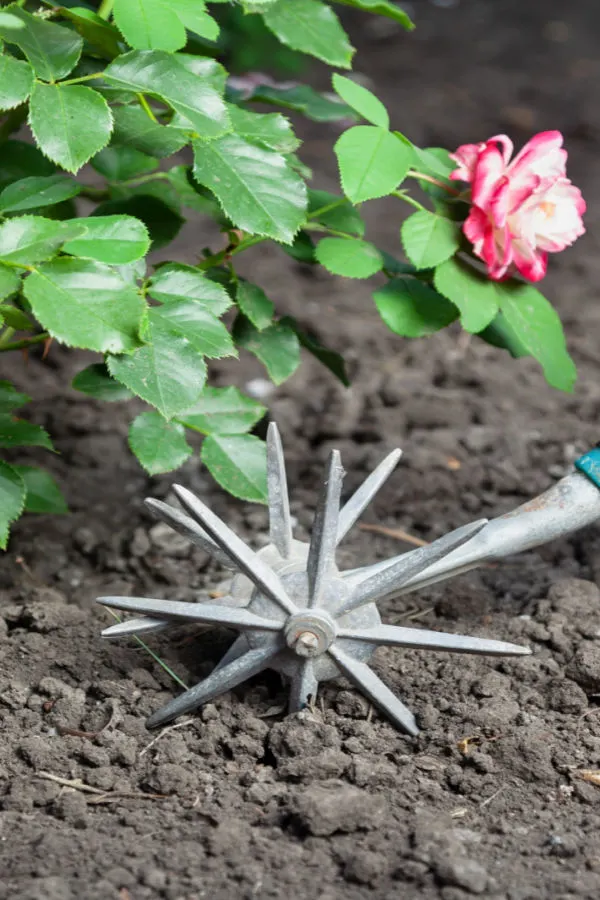
As late summer turns to early fall, you will need to apply one more dose of fertilizer to your shrub and climbing roses. This will help continue strong growth until the plant goes dormant. More importantly, it will help your rose bush to begin storing up power for next year’s blooms.
One thing you don’t want to do is to fertilize too late in the Autumn season. Powering your rose bushes right before they go dormant can cause unwanted tender growth. And that growth is very susceptible to winter damage.
Fertilizing Tea, Grandiflora, Floribunda & Miniature Roses
For more standard rose bushes, you need to fertilize more frequently in-season to keep your roses powered up for consistent blooming. For starters, apply an early spring application of dry fertilizer to help produce strong foliage and early bloom sets.
After the spring feeding, for these types of roses, you can begin applying additional applications of liquid fertilizer every 3 to 4 weeks throughout the spring and summer. Liquid compost, worm casting tea or a liquid rose fertilizer all work excellent here.

By applying in season, you keep your roses supplied with ample power to bloom and re-bloom. Even more, it helps to power more robust and colorful blooms!
When applying liquid fertilizer on roses, it is best to water the soil around the plant and not the foliage. They are simply too likely to suffer burn or leaf damage. As late summer turns to early fall, you can then apply one last dose of dry fertilizer to complete the schedule.
Here is to fertilizing your rose bushes this year for big blooms and big color in your landscape! Happy Gardening – Jim and Mary.
Jim and Mary Competti have been writing gardening, DIY and recipe articles and books for over 15 years from their 46 acre Ohio farm. The two are frequent speakers on all things gardening and love to travel in their spare time.
As always, feel free to email us at thefarm@owgarden.com with comments, questions, or to simply say hello! You can sign up for our free email list in the subscribe now box in the middle of this article. Follow us on Facebook here : OWG Facebook. This article may contain affiliate links.

